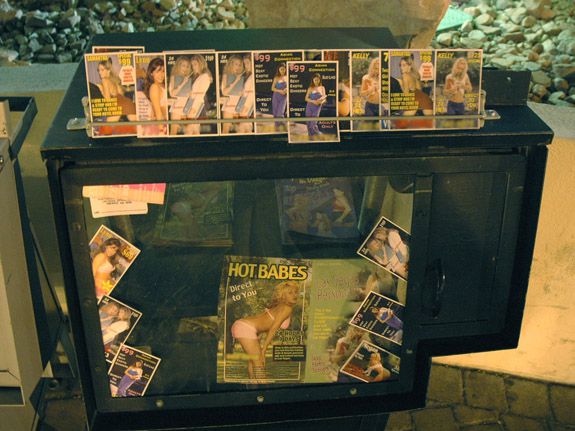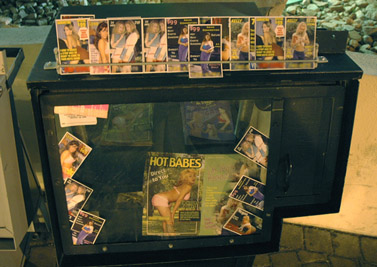
I was hiding behind a dumpster in the parking lot next to our apartments with Jorge, the neighbor’s nephew who would visit on weekends. He was three years older than I was. Today he had a wrinkled newspaper whose pages were filled with photos of strange looking women. They were classifieds; the type found in the back of an LA Weekly or more like those in an LA Xpress. I’d grown up in a household of women and somehow, here at eight years old, I knew I wasn’t supposed to be looking at these women.
The pages were thin, almost transparent. The pictures, poorly taken, showed fuzzy-faced women bent forward. Often, their large breasts were scooped into a tight top to emphasize cleavage. Sometimes they were turned away, looking back shyly, pulling up a pantyhose, apprehended in the seemingly clandestine act of getting dressed. Having never seen any uncovered in person, the breasts looked like overinflated balloons. And their faces were shaded with too much lipstick and blush—so much that their features looked bruised instead of enhanced. Now, decades later, I know that Jorge was showing me advertisements for female escorts.
Moments worth saving were photographed. But I’d never imagined anyone would want their picture taken for strangers to see.
The next thing I remember is my uncle walking up behind us and asking what we were up to. It was too late to conceal the paper. Jorge was sent to his aunt’s house, and I returned home with my uncle. He simply said to me that I was too young to be looking at these kinds of pictures, and I should not be hanging out with older boys like Jorge. My uncle said he was a bad influence, and I should stay away from him. There was something fascinating about images of unknown semi-naked women; I wondered if there were newspapers filled with images of semi-naked men.
The only pictures my family owned were those taken during holidays, birthdays, or family vacations. Moments worth saving were photographed. But I’d never imagined anyone would want their picture taken for strangers to see. The incident with Jorge was never mentioned again.
A few years later, I’d discover pictures of half-naked women again, and this time there were men, too. My mother had begun to date a man named Greg. They’d met at work, and eventually he moved in with us. He was a white man, as tall as the flagpole at school, but twenty times as wide. He had a red face with a dark, thick mustache like those policemen on T.J. Hooker. He had cloudy blue eyes, sometimes smoked, and liked to say shit a lot.
One day, I remember my classmate, Tony Muro, saying Greg was famous. And when I didn’t believe him, he brought a magazine he’d found under his older brother’s bed called Café Flesh. Its glossy, sticky pages held naked women with creamy yellow teeth, legs bent backwards behind their heads, all covered in baby oil or something. And there he was, in a dimly lit office, wearing an unbuttoned shirt and undone tie. I’d recognize that mustache anywhere. His secretaries were naked from the waist up, kneeling in front of him with their backs to us. The veins of his neck expanding, eyebrows arched and bent with anger. He looked like he was yelling at them. Maybe they had spilled some milk on the carpet or interrupted him while he was talking. Tony was right; there he was in that magazine, a staple through his left nipple, staring just the way he does at me when I forget to say excuse me or knock before entering. I’d never tell that I had seen him in Tony’s magazine. But I wondered if Mom knew about his other life and what other secrets Greg had.
Days later, I’d come home from school and find the door to Mom’s vacant room closed. My sisters were in their rooms. It was getting late, and Mom still wasn’t home. When I asked where she was, my sisters said nothing. I wanted to tell them that Greg had kidnapped Mom. That she would end up in a magazine in Tony’s house.
I tried calling Mom at work, but she’d left work earlier in the day. I called again and asked for Greg. The secretary asked if I was all right and said my mom had left with Greg. I was right; he had taken her away. What did Greg have planned? I snuck into their room hoping to find a clue as to their whereabouts. Hours had gone by when the phone rang; it was Mom. After some crying, I listened intently.
“I’ll be home before you wake up for school tomorrow,” she said.
Nothing was said about the locked trunk in their room. I’d managed to open it after several unsuccessful attempts with a hairpin and a letter opener.
“Where are you? I thought you had disappeared. I thought you had been kidnapped.”
She laughed. She and Greg had left work early to take a drive to the coast for a dinner. I had nothing to worry about. I went to bed shortly after, my sisters still oblivious to the crisis I’d endured.
The next morning Mom was there to make sure I left to school on time. Greg would be picking me up later because she had to work late. Nothing was said about the locked trunk in their room. I’d managed to open it after several unsuccessful attempts with a hairpin and a letter opener. Finally with a butter knife, its lock popped open revealing a stack of videotapes and magazines like the one Tony had brought to school. I’d considered watching the videos, but I couldn’t without being caught by my sisters.
That afternoon, on the way home from school, Greg asked about my day, about the boys he’d seen me waiting with on the curb. He asked why I’d been so worried yesterday. Everything seemed to move on fast-forward. The pitch of his voice becoming deeper, he asked if I’d been in their room. My mind raced to the images in Tony’s magazine of Greg’s bulging neck from his undone shirt. His mustache wet with spit from shouting. My mother, still, nowhere to be found in that dimly lit office.
A Los Angeles native, Ruben Quesada is the author of Next Extinct Mammal. His poetry has appeared or is forthcoming in Cimarron Review, American Poetry Review, Third Coast, and Rattle, among others. He is the Founding Editor of CodexJournal, and Poetry Editor at The Cossack Review.
